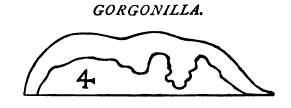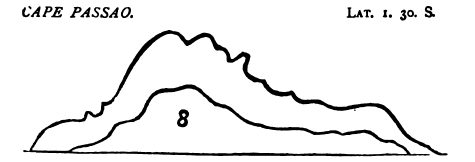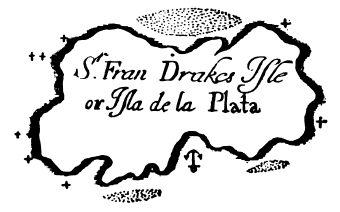| Web and Book design,
Copyright, Kellscraft Studio 1999-2016 (Return to Web Text-ures) |
 (HOME)
|
| CHAPTER XI. The Buccaneers depart from the Isle of Gorgona, with design to plunder Arica. Mey lose one another by the way. They touch at the Isle of Plate, or Drake's Isle, where they meet again. Description of this Isle. Some memoirs of Sir Francis Drake. An account of this voyage, and the coasts all along. They sail as far in a fortnight, as the Spaniards usually do in three months.
ON Sunday, July 25th, in the afternoon, all things being now in readiness for our departure, we set sail, and stood away from the island of Gorgona, or Sharp's Isle, with a small breeze which served us at N.W. But as the sun went down that day, so our breeze died away by degrees. Yet already we could begin to experiment, that our ship sailed much better, since the taking down of her round house, and the other alterations which we made in her. The next day about two o'clock in the morning we had a land breeze to help us, which lasted for the space of six hours, more or less. So that at noon we found ourselves to be five leagues and a half distant to the south west from Gorgona. This day the Spaniards, our prisoners, told us, in common discourse, that in most part of this lowland coast they find threescore fathom water. In the afternoon we had a very strong land breeze: meanwhile we continued making short trips off and in. That night we had much rain for the greatest part of the night, which occasioned the next morning, being the third day of our navigation, to be very cloudy until ten o'clock. About that hour it cleared up, and then we saw the island of Gorgona at E.N.E. being distant about twelve leagues more or less from us. We had the wind all this day at S.W. where it continued, seldom varying above two points of the compass to the westwards. Night being come, about two o'clock, Captain Sharp ordered me to speak to Captain Cox, and bid him go about and stand off from the shore, for he feared less Cox should come too nigh to it. But he replied, he knew well that he might stand in until two o'clock. The next day very early in the morning, we saw him not, the morning being cloudy and stark calm. Yet notwithstanding at eight o'clock it cleared up, and neither then could we see him. Hence we concluded, and so it proved, that we had lost him in the obscurity of the night, through his obstinacy in standing in too long, and not coming about when we spoke to him. Thus our Admiral's ship was left alone, and we had not the company of Captain Cox any longer in this voyage, till we arrived at the Isle of Plate, where we had the good fortune to find him again, as shall be mentioned hereafter. The weather being clear this morning, we could see Gorgona, at a distance of at least fifteen or sixteen leagues to the E.N.E. All this day it continued calm, till about four in the afternoon, at which time we had a W.S.W. wind, which continued to blow all that night Thursday, July 29th, 1679. This day the wind continued pretty fresh all day long. About four in the afternoon we came within sight of the island del Gallo, which I guessed to be nigh twenty-eight leagues distant from that of Gorgona, the place of our departure S.W. It is about nine leagues distant E. from the main. So that the island with the mainland S.W. from it appears thus.  All this day the weather continued clear, and the wind W.S.W.
The next day, July 30th, the wind blew very fresh and brisk; insomuch, that we were in some fear for the heads of our low masts, being very sensible that they were but weak. About three or four in the afternoon, we saw another island, six or seven leagues distant from Gallo, called Gorgonilla. At E. by S. from us it made the appearance which I have here adjoined. All the mainland hereabouts lies very low and flat, and is in very many places overflowed and drowned- every h igh- water.  On Saturday July 31st in the morning, the island del Gallo, at E.N.E. being distant about eight leagues, gave us this appearance.  The point of Mangroves is a low and level point, running out S.S.W. This day, and the night before it, we lost by our computation three leagues of our way, which I believe happened because we stood out too far from the land, having stood off all night long. August 1st, which was Sunday, we had a very fresh wind at W.S.W. This was joined also with several small showers of rain which fell that day. In the meanwhile we got pretty well to windward with it, by making small trips to and fro, which we performed most commonly, by standing in three glasses, and as many out. The next day, August 2nd, in the morning, we came up into the highland of Santiago, where begins the highland of this coast. We kept at the distance of ten leagues from it, making continual short trips, as was mentioned before. The next day likewise we continued to do the same. But the weather was cloudy, and for the most part full of rain. Wednesday, August 4th, we continued still turning in the wind's eye, as we had done for two days before. This day in the afternoon we discovered three hills at E.N.E. of our ship. These hills make the land of San Matteo, which gives this following appearance:  All the coast along hereabouts is highland. That evening also we saw the cape of San Francisco. At first this cape appeared like two several islands. But two hours after, at the distance of twelve leagues, at S. by W. it looked thus.  Thursday, August 5th, we being then about the cape, it looked very like to Beachy Head in England. It is full of white cliffs on all sides. The land turns off here to E. of S., and makes a large and deep bay, the circumference whereof is full of pleasant hills. In the bight of the bay are two high and rocky islands, which represent exactly two ships with their sails full. We were now come out of the rainy countries, into a pleasant and fair region, where we had for the most part a clear sky, and dry weather. Only now and then we could here find a small mist, which soon would vanish away. In the meanwhile, every night a great dew used to fall, which supplied the defect of rain. The two next days following, we continued plying to windward with fair weather, nothing else remarkable happening in them which might deserve any notice to be taken thereof. On Sunday, August 8th, we came close under a wild and mountainous country. This day likewise we saw Cape Passao, at the distance of ten leagues more or less to windward of us. Ever since we came on this side Mangrove point, we had observed a windward current did run all along as we sailed. Under shore the land is full of white cliffs and groves, lower towards the pitch of the cape. The next day we had both a fair day and a fresh wind to help us on our voyage. We observed that Cape Passao makes three points, between which are two bays. The leeward-most of the two, is of the length of three leagues, and the other of four. Adjoining to the bays is seen a pleasant valley. Our prisoners informed us, that northward of these capes live certain Indians, who sell maize, and other provisions to any ships that happen to come in there. The Cape itself is a continuous cliff; covered with several sorts of shrubs and low bushes. Under these cliffs lies a sandy bay of the depth of forty feet. The Spaniards say, that the wind is always here between the S.S.W. and W.S.W. The cape represents with much likeliness the brow of an alligator or cayman. At S. Cape Passao appears thus:  Tuesday, August 10th. This morning the sky was so thick and hazy, that we could not see the highland; though it were just before us, and not altogether two leagues distant from us. But as soon as it cleared up, we stood in towards the land, until we came within a mile of the shore. Here, having sounded, we found seven fathom and a half of water, under which was a light and clayey ground. The coast all along is very mountainous, and likewise full of high and towering cliffs. When we sounded, the tide was almost at low-water. Here it ebbs and flows nearly four fathom perpendicular. From this cape the land runs along S.E. for the space of three or four leagues, with huge highland cliffs, like those of Calais over against England. Being past this cape, the highland S. from us is Cape St. Lawrence. August 11th, we found ourselves N.N.W. from Monte de Christo, a very high and round hill. Thence to windward is seen a very pleasant country, with spots here and there of woody land; which causes the country all over, to look like so many enclosures of ripe cornfields. To leeward of the said hill, the land is all high and hilly, with white cliffs at the sea-side. The coast runs S.W. till it reaches to a point of land, within which is the port of Manta, as it is called. This port of Manta is nothing else than a settlement of Spaniards and Indians together where ships that want provisions call in, and arc furnished with several necessaries. About six or seven leagues to windward of this port is Cape St. Lawrence, butting out into the sea, being in form like the top of a church. Monte de Christo gives this appearance at sea:  The cape rises higher and higher from the port of Manta. As we sailed along we saw multitudes of grampuses every day; also water-snakes of divers colours. Both the Spaniards and Indians are very fearful of these snakes, believing there is no cure for their bitings. At the distance of eight leagues, or thereabouts, to leeward of Cape St. Lawrence, it appears thus:  This day before night we came within sight of Manta. Here we saw the houses of the town belonging to the port, which were not above twenty or thirty Indian houses, lying under the windward and the mount. We were not willing to be descried by the inhabitants of the said place, and stood off to sea again. On Thursday, August 12th, in the morning, we saw the island of Plate at S.W. at the distance of five leagues more or less. It appeared to us to be an even land. Having made this island, we resolved to go thither and refit our rigging, and get some goats which there run wild up and down the country. For, as was said before, at this time we had no other provision than flour and water. The island itself is indifferent highland and off at sea looks thus, as is here described:  But the
highland of Cape Passao, of which we have spoken before, at the
distance of fifteen leagues to N., gives in several hummocks this
appearance: 
The land of Cape St. Lawrence is all white cliffs; the head of the cape running N. and S. This day several great whales came up to us, and dived under our ship. One of these whales followed our ship, from two in the afternoon till dark night. The next morning very early, at about six o'clock, we came under the aforesaid Isle of Plate, and here unexpectedly, to our great joy, we found at anchor the ship of Captain Cox, with his whole company, whom we had lost at sea for the space of a whole fortnight before. We found they had reached this island, and had been there at anchor four days before us, being now just ready to depart thence. At about seven we came to anchor, and then the other vessel sent us a live tortoise, and a goat to feast upon that day, telling us withal, of great store of tortoises to be found ashore upon the bays, and of much fish to be caught hereabouts. The island is very steep on all sides, insomuch, that there is landing only on the N.E. side thereof, where is a gully, nigh to which we anchored in twelve fathom water. Here at the distance of a furlong, or little more from the shore as you go to land, you will see on the left hill a cross still standing, there erected in former times. No trees are to be found on the whole island, but only low shrubs, on which the goats feed, which cattle is here very numerous. The shore is bold and hard, neither is there any water to be found upon it, excepting only on the S.W. side of the island, where it cannot be come at, lying so much enclosed by the rocks, and too great a sea hindering the approach to it in boats. This island received its name from Sir Francis Drake and his famous actions, for here it is reported by tradition that he made the dividend, or sharing of that quantity of plate which he took in the Armada of this sea, distributing it to each man of his company by whole bowls full. The Spaniards affirm to this day that he took at that time twelve score tons of plate, and sixteen bowls of coined money a man, his number then being forty-five men in all. Insomuch that they were forced to heave much of it overboard, because his ship could not carry it all. Hence was this island called by the Spaniards themselves the Isle of Plate, from this great dividend, and by us Drake's Isle. All along as we sailed, we found the Spanish pilots to be very ignorant of the coasts. But they plead thus much for their ignorance, that the merchants, their employers, either of Mexico, Lima, Panama, or other parts, will not entrust one penny worth of goods on that man's vessel that corks her, for fear she should miscarry. Here our prisoners told us likewise, that in the time of Oliver Cromwell, or the commonwealth of England, a certain ship was fitted out of Lima with seventy brass guns, having on board her no less than thirty millions of dollars, or pieces of eight, all which vast sum of money was given by the merchants of Lima, and sent as a present to our gracious king (or rather his father) who now reigneth, to supply him in his exile and distress, but that this great and rich ship was lost by keeping along the shore in the Bay of Manta above-mentioned, or thereabouts. What truth there may be in this history, I cannot easily tell, at least, it seems to me as scarce deserving any credit. At
this island we took out of Mr. Cox's ship the old Moor (for of that
nation he was), who pretended he would be our pilot to Arica. This was
done, lest we should have the misfortune of losing the company of Cox's
vessel, as we had done before, our ship being the biggest in burden,
and having the greatest number of men. Captain Peralta admired
oftentimes that we were got so far to windward in so little space of
time; whereas they had been, lie said, many times three or four months
in reaching to this distance from our departure. Their long and tedious
voyages, he added, were occasioned by their keeping at too great a
distance from the shore. Moreover, he told us, that had we gone to the
islands of Galapagos, as we were once determined to do, we had met in
that voyage with many calms, and such currents, that many ships have by
them been lost and never heard of to this day. This island of Plate is
about two leagues in length, and very full of both deep and dangerous
bays, as also such as we call gullies in these parts. The circumference
and description of the said island is exactly thus:  We caught at this island and salted, good number of goats and tortoises. One man standing here on a little bay in one day turned seventeen tortoises; besides which number our mosquito strikers brought us in several more. Captain Sharp, our commander, showed himself very ingenious in striking them, he performing it as well as the tortoise strikers themselves. For these creatures here are so little fearful, that they offer not to sink from the fishermen, but lie still until such time as they are struck. But we found that the tortoises on this side were not so large, nor so sweet to the taste, as those on the north side of the island. Of goats we have taken, killed, and salted, above a hundred in a day, and that without any labour. While we stayed here, we made a square maintopsail yard. We cut also six feet off our bowsprit, and three feet more off our head. Most of the time that we remained here, we had hazy weather, Only now and then the sun would happen to break out, and ther to shine so hot that it burnt the skin off the necks of several of our men. As for me, my lips were burnt in such a manner that they were not well in a whole week afterwards. |